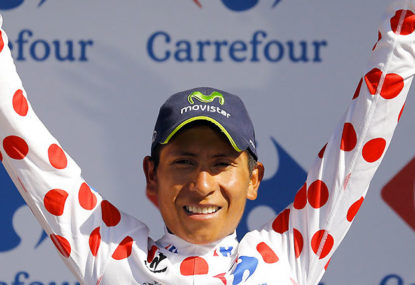'I've just won a stage of the Tour de France, mate!': Hindley grabs yellow jersey as Aussie blows Tour apart
Australia's Jai Hindley has said he is "lost for words" after a shock stage victory at the Tour de France earned him the leader's…

Two weeks ago, I was critical of the en masse decision by the peloton not to race on the rain-drenched streets of Bari in Stage Four of the Giro d’Italia.
To me, the Commissaires should be the ones who decide when it’s safe to race, and if they say it’s ok, then so be it.
If riders still feel unhappy, let it be an individual decision as to who wants to take a risk and go for honours.
Because that was the problem, not everyone wanted the same thing. Some wanted to ride and some didn’t.
That stage in Bari was a flat one and, as we saw when the tempo did finally increase, there were a couple of crashes which affected the finale. Ultimately, it was a hollow victory for Nacer Bouhanni because time bonuses were neutralised and not everyone was going for the win.
Don’t think for a moment I want to see anyone badly hurt on a dangerous road, but I do admire riders who battle through crazy elements to snatch a win. And so it without saying I am full of admiration for the riders that braved Tuesday night’s horrendous conditions in Stage 15 as the Giro took on the Passa Gavia and the Passa D Stelvio.
Of course, last year we saw that incredible finish on Stage 20, when Vincenzo Nibali emerged from the fog to win and all but seal the overall win. But that was a stage with several climbs rubbed out due to the bad weather and fears over rider safety on the treacherous descents.
It looked to me that conditions were not any better for Tuesday night’s stage, so why did we not have an altered race route? A lot didn’t even want to start, but were over-ruled by the race organisers. I struggle to understand why.
Why they were told to start, that is. This, in some ways, contradicts what I wrote two weeks ago, but last night just didn’t seem right.
It’s one thing to be worried about crashing on a wet road. It’s another thing to crash on a wet road when it’s close to or below freezing and you’re riding up and down one of Europe’s highest mountain passes. By Stage 16 of a Grand Tour, many riders are already at their physical limit anyway, so subjecting them to a day in frigid cold and wet can only open them up to a greater risk of illness.
Then there are the descents. As I said, last year, some big climbs were taken out because the descents were dangerous.
On Tuesday night, the peloton was well on its way up the Stelvio, when the message came through that maybe the descent of this alpine beast was to be neutralised. Maybe. No one actually seemed to know for sure. Farce. Again.
It was disappointing that last year’s stage up the Stelvio and Gavia was cancelled, but looking at last night’s weather you can see why. So why did they race on Tuesday night?
Given this wasn’t the final mountain stage of this Giro, was it really necessary to ride? Was it the pressure of knowing that twelve months ago the equivalent stage was cancelled? Did they misjudge the weather?
To watch the descent of the Stelvio was nerve-racking, but thankfully, no one crashed and we got to see one of the most incredible performances on the final climb of the day, a brand new Giro ascent, the Val Martello Martelltal.
Watching Nairo Quintana just ride away from everyone except 2012 Giro winner Ryder Hesjedal to tear the Maglia Rosa from Rigoberto Uran Uran’s shoulders was magnificent. We will see this 2059-metre climb again. It was beautiful. But should we have seen it all?
Uran Uran (who lost 4:12) and Cadel Evans (who lost 4:48) are possibly two riders wishing the stage was cancelled as their Giro hopes look shot now. The weather may return the favour in the days to come and Quintana’s 1:41 advantage over them (Uran 1:41 and Cadel 3:21) may be snatched away just as quickly, but we don’t know that yet.
What we also don’t know is whether riders already weakened by two weeks of Grand Tour racing will survive the remaining few days. The fact that many riders finished in short sleeves, with no rain jackets or gloves , may justify the decision to not cancel the stage but real damage could be still to come.
Grand Tour cycling, is there a tougher and more unpredictable sport?